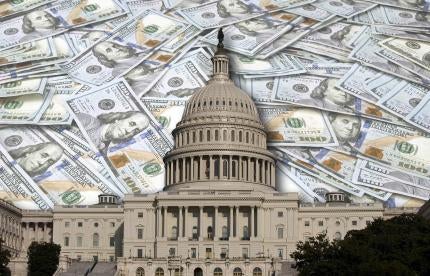Congress Returns, Works on “Must Pass” Bills.
Following their Fourth of July recess, members of the U.S. Congress returned to Washington, D.C., this week and turned their attention to several “must pass” pieces of legislation, including the National Defense Authorization Act (NDAA) (which passed the U.S. House of Representatives this morning by a vote of 219–210) and federal government funding. These and similar bills—such as legislation to reauthorize the Federal Aviation Administration—will factor considerably into the congressional agenda for the remainder of the year. The work on the NDAA this week is a particularly good example of how quickly the political winds can change in Washington, D.C. At this time last year, the Buzz was tracking labor and employment amendments that were included in the House’s version of the NDAA. With Republicans in the majority in the House, that is not the case this year.
Overtime Proposal on the Way.
On July 12, 2023, the Office of Information and Regulatory Affairs (OIRA) received for review the U.S. Department of Labor’s Wage and Hour Division’s (WHD) proposal to amend the overtime implementing regulations of the Fair Labor Standards Act. While the proposal is not public at this time, this action means that WHD could release the proposal for public comment toward the end of summer or early fall. Assuming WHD follows through with the proposal, proposed changes to the overtime regulations will be a major issue this fall, and employer groups and Republicans in Washington, D.C., are already preparing for a significant debate.
Senate Confirms Kotagal to EEOC.
On July 13, 2023, the U.S. Senate voted 49–47 to confirm Kalpana Kotagal as a commissioner on the U.S. Equal Employment Opportunity Commission (EEOC). Two-and-a-half years into the Biden administration, Kotagal’s confirmation finally tilts the majority at the Commission in favor of the Democrats, as Kotagal will join Chair Charlotte Burrows and Vice Chair Jocelyn Samuels in the majority. This means that the Commission’s policy agenda—which has been relatively dormant during this administration—will soon pick up steam, and employers can expect the EEOC to address issues such as issuance of rules implementing the Pregnant Workers Fairness Act, the collection of payroll data, regulations governing employer wellness programs, and sexual harassment guidance.
Senate Committee Advances NLRB, NMB Nominees.
On July 12, 2023, the U.S. Senate Committee on Health, Education, Labor and Pensions (HELP) voted to advance the nominations of Gwynne Wilcox (nominated to serve another term on the National Labor Relations Board (NLRB)) and Loren Sweatt (nominated to serve on the National Mediation Board (NMB)). Wilcox made it through on a 12–9 vote, with Senator Lisa Murkowski (R-AK) providing the lone Republican affirmative vote. (In 2021, Senator Murkowski voted to confirm Wilcox to her first term on the Board.) Sweatt, who is currently a senior professional staffer on the HELP Committee and previously served as principal deputy assistant secretary for the Occupational Safety and Health Administration (OSHA), was approved unanimously. The nominees now await a vote on the Senate floor.
Injury and Illness Reporting Reg. Nears Finalization.
On July 11, 2023, OIRA concluded its review of OSHA’s proposed regulation to “Improve Tracking of Workplace Injuries and Illnesses.” This means that a final rule could be released as early as next week.
Foxx Seeks Answers Regarding Su’s Tenure.
Speaking of nominations, Julie Su’s nomination to serve as secretary of labor remains stalled in the Senate. Republicans continue to put political pressure on Su, not just in relation to her nomination, but also relating to her current role as acting secretary of labor. In fact, House Committee on Education and the Workforce Chair Virginia Foxx (R-NC) has questioned whether federal law permits Su to continue to serve as acting secretary. In a July 6, 2023, letter to the U.S. Government Accountability Office, Chair Foxx asked for answers regarding which of two federal provisions—the Federal Vacancies Reform Act of 1998 or 29 U.S.C. § 552 (“Deputy Secretary; appointment; duties”)—controls Su’s acting service. Republicans clearly are not interested in Su’s policy preferences, regardless of whether she serves in an acting or formal capacity as secretary of labor.
Medal of Honor.
On July 12, 1862, in the middle of the Civil War, President Lincoln signed into law a bill creating the U.S. Army Medal of Honor. After Lincoln authorized the Medal of Honor for the Navy in 1861, Senator Henry Wilson of Massachusetts (who later served as vice president under President Ulysses S. Grant) sponsored “A Resolution to provide for the Presentation of ‘Medals of Honor’ to the Enlisted Men of the Army and Volunteer Forces who have distinguished, or may distinguish, themselves in Battle during the present Rebellion.” (Officers were made eligible for the honor in 1863). Jacob Parrott, a member of “Andrews’ Raiders,” who participated in a Union Army mission to cripple Confederate railways, was the first recipient of the Medal of Honor. Congress has since authorized—and standardized the criteria for—Medals of Honor for the Army, the Naval Service (awarded to servicemembers of the U.S. Navy, the U.S. Marine Corps, and the U.S. Coast Guard), and the Air Force (awarded to servicemembers of the U.S. Air Force and U.S. Space Force).




 />i
/>i

